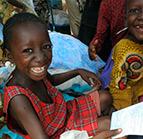Reviewing the Evidence on Child Survival SBCC Programs
 In January 2013, 27 experts and practitioners in social and behavioral change communication (SBCC) met in Addis Ababa, Ethiopia, for the Population-Level Social and Behavior Change Evidence Review for Child Survival in Africa. The technical objective for this meeting hosted by UNICEF and USAID was to collect specific evidence-based impacts of health and social behavior change interventions from East Africa, including peer-reviewed academic research, unpublished studies, program and project evaluation reports, and documented country case studies. I was honored to lead the collection and review of this evidence with my colleagues, some of whom have been doing this work for decades.
In January 2013, 27 experts and practitioners in social and behavioral change communication (SBCC) met in Addis Ababa, Ethiopia, for the Population-Level Social and Behavior Change Evidence Review for Child Survival in Africa. The technical objective for this meeting hosted by UNICEF and USAID was to collect specific evidence-based impacts of health and social behavior change interventions from East Africa, including peer-reviewed academic research, unpublished studies, program and project evaluation reports, and documented country case studies. I was honored to lead the collection and review of this evidence with my colleagues, some of whom have been doing this work for decades.
In addition to 2 days of meetings with regional experts, our group participated in the Africa Leadership for Child Survival: A Promise Renewed meeting at the African Union. This meeting was attended by more than 120 delegations from Ministries of Health across the African continent, including 12 participants at the Ministerial level and global health experts. I was fortunate enough to participate in a panel presentation on SBCC Evidence and Child Survival with my colleagues Dr. Martin Alilio, USAID Senior Malaria Technical Advisor of the U.S. President’s Malaria Initiative; Yonas Dare, Head of Programs of the Ethiopian Interfaith Forum for Development Dialogue and Action (EIFDDA); Rocio Berzal, Communication Specialist at UNICEF Niger; and Dr. Kerida McDonald, Chief of Communications at UNICEF Ethiopia. As a result of our panel, which showcased examples of SBCC evidence positively impacting child survival, many Ministers spoke in their closing remarks about the need to incorporate SBCC into their child and maternal health country plans.
VIDEO: Child Survival Evidence to Action Pre-Summit Meeting — Ethiopia
This week I will present the outcomes of our evidence review meeting and advocacy work with the African Union at a pre-summit meeting at UNICEF Headquarters in New York. Many academics and practitioners serving on Evidence Review Teams to assess the global literature on child survival interventions will be in attendance. The next step is to take all the peer-review and gray literature on successful interventions in East Africa and summarize them in an article, with recommendations for turning the evidence into action.
It is exciting to see international agencies such as USAID and UNICEF showing such commitment to using evidence to formulate next steps. It is only through “evidence to action” that child survival issues will be addressed effectively.






Leave a Reply
Want to join the discussion?Feel free to contribute!